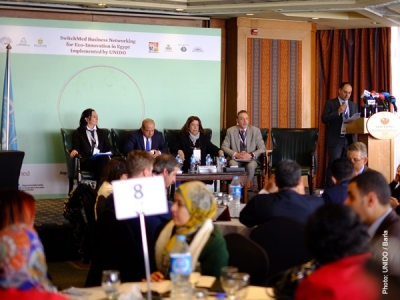SwitchMed brings opportunities of EU eco innovative applications to manufacturers in Egypt

Some 300 stakeholders from the Egyptian industry took part on 27 February in the B2B networking event organised by the EU-funded SwitchMed programme in Cairo, to present EU eco innovative business solutions that could boost the transition of their businesses into circular business models.
The event uncovered the potential of 8 EU-funded eco innovative solutions that had been carefully selected to match the needs of Egypt’s production sectors and challenges. With over 110 business consultations between 66 Egyptian businesses and the 8 eco innovation providers, the event is set to have a meaningful contribution to new cooperation agreements between the knowledge competences of the latest EU on eco innovative applications and Egypt’s industry.
Recognising that SMEs in Egypt are facing difficulties in realising their potential impact on sustainability, the application of EU eco-innovation solutions could contribute to lower the production costs and increase the environmental performance of their business operations. Multiplexed Laser Surface Enhancement (MLSE), one of the eco innovations presented in Cairo, could for instance assist the important textile industry in Egypt to save up 99% percent of energy costs in their textile finishing
Eco-innovation can become a key driver of industry efforts to tackle climate change and realise “green growth” calling for faster introduction of breakthrough technologies and for a more systemic application of available solutions. The SwitchMed B2B Networking events for EU eco innovations, held so far in Lebanon, Tunisia, Morocco and Egypt, have gathered more than 1000 stakeholders from the industry sector and created 320 B2B consultations between local businesses and European eco innovators.
The SwitchMed sustainable consumption and production programme aims to promote a switch by the Mediterranean economies towards sustainable consumption and production patterns and green economy, including low-emission development, through demonstration and dissemination of methods that improve resource and energy efficiency. It also seeks to minimise the environmental impacts associated with the life cycle of products and services and, where possible, to promote renewable energy.
Read more





























 Syria
Syria 




